.jpg?width=5175&height=3451&ext=.jpg)
European collaboration in FLORENCE project Using AI to improve treatment of patients with colorectal cancer
One in four patients in Denmark experience complications after colon cancer surgery, leading to re-admission, permanent damage and, in some cases, early death. A new research project, called FLORENCE, aims to improve the diagnosis, prognosis and treatment of patients with colon cancer. The project will develop an artificial intelligence (AI) tool to give doctors a better basis for decisions on patient treatment.
In addition to AI, the FLORENCE project uses the OMOP Common Data model. This model allows personalised health data from different research institutions (such as European hospitals) to be structured uniformly, making it easier for researchers and clinicians to share, compare and analyse data. This allows them to better understand the effectiveness of treatments, drug safety and understanding disease patterns on a large scale. The OMOP model has developed a common language in which different types of health information such as diagnoses, treatments, laboratory results and medication data can be coded and stored. All necessary to compare and link data from different research institutions.
For the first time on a global scale, the project links the AI model directly to clinics through federated learning. Therefore, the project is unique in its approach because decision support in the treatment of colorectal cancer patients directly benefits patients.
Partners
The project's lead partner is the Centre for Surgical Science and Research Department at University Hospital Zealand in Køge (Denmark). Partners are Oslo University Hospital (the oncological pelvic surgery unit and the Cancer Registry of Norway, respectively), the University of Lund (Sweden) and the Technical University of Denmark. IKNL is also a partner within the project. IKNL will help provide the software for federated learning: the vantage6 infrastructure. In addition, IKNL will contribute knowledge on the OMOP common data model. The ambition is to test the insights and results from FLORENCE on the Dutch patient population via the Dutch Cancer Registry (NKR).
Incidentally, the figures in the Netherlands differ from those in Denmark: In the Netherlands, the number of patients with a complicated course (definition complication leading to death, readmission or prolonged hospitalisation) for recurrence carcinoma is 21% and for colon carcinoma 15%. The rate of readmissions within 90 days is only 11% and 6%, respectively (source: data DCRA (DICA) 2022). It was precisely the differences in outcome measures within Scandinavia that prompted this European collaboration.
Federated learning with vantage6
Within IKNL, we use federated learning in many projects; the term Personal Health Train is also often used for this. Together with other partners, IKNL has developed software for federated learning: vantage6. This software ensures that various parties, such as hospitals and researchers, can talk to each other: you can issue queries (questions) and receive the answers back. Here, patient data remain decentralised, for instance in the hospital's EPR, and only the algorithms 'travel' like a train along data sources with a specific, defined task.
More information
For questions, please contact Gijs Geleijnse, senior clinical data scientist IKNL and Anja van Gestel, clinical data scientist IKNL.